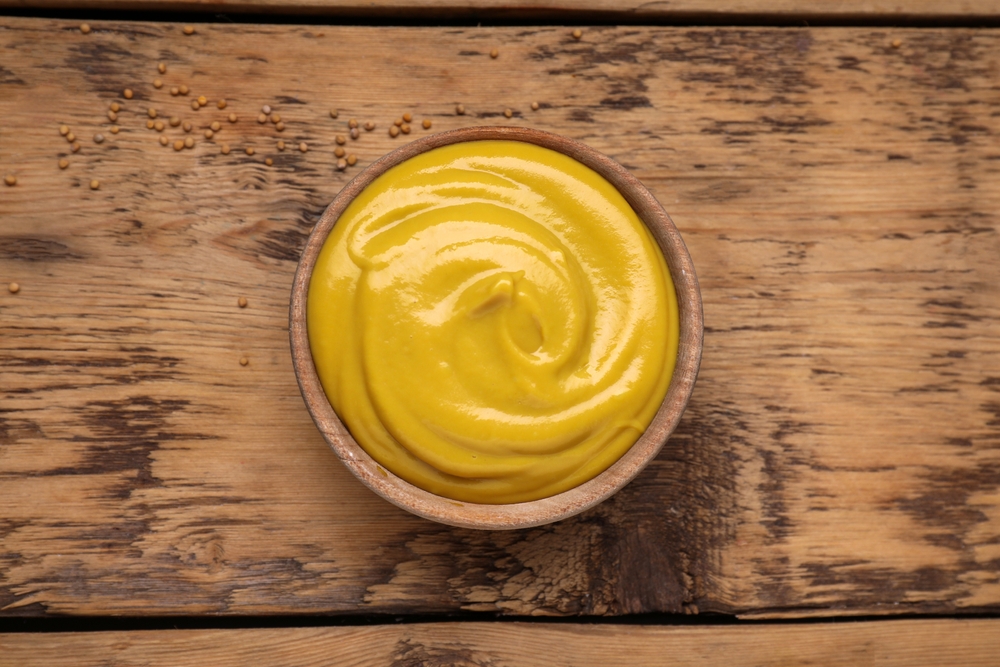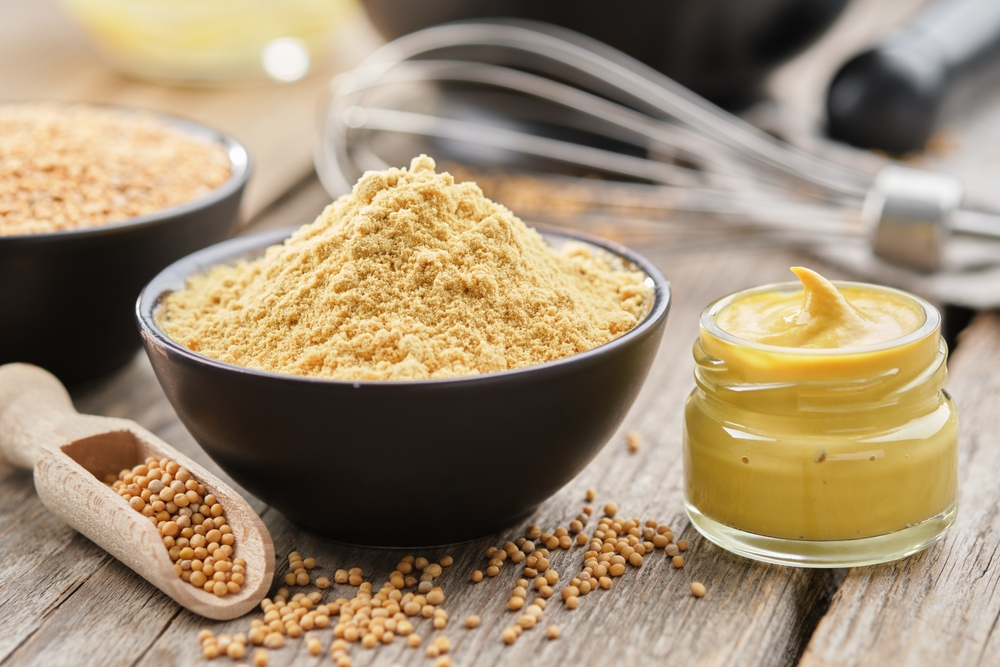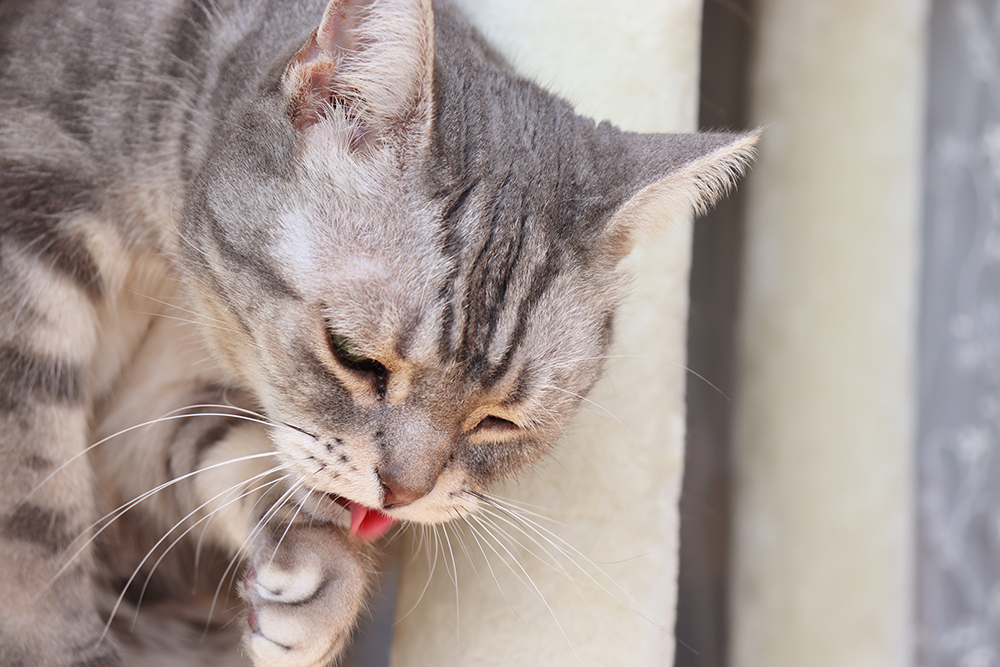A cat sneaking a style of the turkey sandwich you unintentionally left on the counter can appear innocent till you take into account every part that could be in it. Whereas many toppings like lettuce or mayo could also be protected for cats to eat carefully, mustard could cause points particularly in giant quantities, making it unsuitable on your pet’s weight-reduction plan.
It might appear unusual that an on a regular basis meal addition like mustard may be palatable for people however problematic for cats, nevertheless it is only one of numerous examples of protected human meals that may damage our pets. Let’s discover the extent of the problems concerned on this clarification of why cats can’t eat mustard.

Why Can’t Cats Eat Mustard?
The primary substances in most mustard sorts are vinegar (distilled or apple cider vinegar) and mustard seed. Whereas each are important in creating mustard’s distinct taste, they will additionally work collectively to worsen your cat’s digestive system. Add just a few marginal but extremely poisonous spices, together with garlic and onion powder, and we’ve all of the makings for a poor expertise.
All mustard varieties include mustard seed (usually floor into mustard powder), with differing types including distinctive taste and shade to every mustard fashion. Yellow mustard seeds and powder give conventional yellow mustard its comparatively gentle taste, whereas probably the most intense brown mustard seeds give brown and Dijon varieties their signature spicy kick.

Gastrointestinal Upset
Vinegar and mustard seeds in desk mustard aren’t essentially poisonous to cats, however they will have hostile results when your pet eats them in extra. Though vinegar could have some advantages, the acidity might trigger an upset abdomen.
Likewise, some compounds in mustard seed can promote oral and gastrointestinal points, although mustard is unlikely to trigger lasting harm. When cats eat greater than a lick of mustard, it could trigger instant indicators of gastroenteritis, similar to:
- Extreme drooling
- Vomiting
- Diarrhea
- Abdomen ache
- Lack of urge for food
Dry mustard powder is typically used to induce vomiting in pets, although it isn’t advisable. Veterinarians level out that this and plenty of different house cures (e.g., liquid dish cleaning soap, scorching sauce) are usually contraindicated, as safer, much less aggressive, and extra dependable choices can be found. By no means induce vomiting at house with out supervision of a vet.
Mustard Seed Compounds
The compound that provides mustard its pungent aroma and sharp taste is allyl isothiocyanate. Its off-putting style is a protection mechanism to guard the plant from herbivores. Past mustard seed, this compound is considerable in equally spicy vegetation like horseradish and wasabi.
Fortuitously, mustard seed’s repellency is normally efficient in opposition to many animals. Alongside the acrid style of vinegar in mustard, the flavour sometimes retains cats from consuming something greater than a small style if it doesn’t deter them totally.

Extra Poisonous Substances
Though many frequent mustard spices like turmeric and paprika received’t hurt a cat, the garlic and onion powder that mustard usually comprises are extremely poisonous to cats, even in small quantities. Garlic, onion, and different Alliums are among the many prime toxins for cats in on a regular basis meals.
Indicators of Garlic and Onion Toxicity
Indicators of garlic poisoning start with gastroenteritis, involving vomiting, diarrhea, and abdomen ache. The difficulty will then progress to oxidative harm to the cat’s pink blood cells, with indicators together with:
- Fast or troublesome respiration
- Elevated coronary heart charge
- Pale mucous membranes
- Lethargy
- Darkish-colored urine
- Weak spot and collapse
Cats are roughly two to a few instances extra vulnerable to hemoglobin harm than different species, so it usually takes lower than ⅛ teaspoon of garlic powder to trigger poisoning. Fortuitously, a typical mustard recipe solely has about ⅛–1 teaspoon of garlic powder for each few cups of mustard. Since cats usually received’t have quite a lot of licks, they’re unlikely to ingest extreme quantities of garlic in a single sitting.
Hematological harm is cumulative, although, because it takes time for bone marrow to switch the broken pink blood cells. In case your cat ingests small quantities of garlic and onion day by day, they’re extra prone to undergo harm.

What to Do If Your Cat Eats Mustard
Assess how a lot mustard your cat has eaten. In the event that they solely ingested just a few licks, present recent water and monitor for indicators of misery. As a result of many compounds that promote abdomen upset, your cat could vomit or have diarrhea, however they’ll usually recuperate shortly, sometimes inside just a few days.
In case your cat eats an extreme quantity and exhibits extreme indicators of misery and ongoing vomiting and diarrhea, contact your vet or a pet poison management hotline. On-line cat telehealth providers are additionally obtainable for instant recommendation, usually freed from cost, to assist decide whether or not it is best to search instant medical care.
💛 😺 Communicate To a Vet On-line From the Consolation of Your Sofa!

If you want to communicate with a vet however can’t get to 1, head over to PangoVet. It’s a web-based service the place you may discuss to a vet on-line and get the personalised recommendation you want on your pet — all at an reasonably priced worth!

Conclusion
Though your cat could have hostile results from the vinegar and mustard seed, issues from consuming mustard are unlikely to progress previous non permanent vomiting or diarrhea. Cats sometimes have little want to eat mustard because of its intense aroma and taste, so overconsumption is a uncommon concern. Nonetheless, it’s vital to make a behavior of defending your sandwiches, hamburgers, and scorching canine, and also you’ll possible by no means have to fret about your cat having greater than they will deal with.
Featured Picture Credit score: New Africa, Shutterstock



